The following commentary comes from the web site www.africafocus.org. We have found AfricaFocus to be a valuable source of analysis of many of the issues that impact upon Afrika and Afrikan people today, from Cairo to Cape Town, from Senegal to Somalia, and across the Afrikan Diaspora. The analyses, edited by William Minter, are sometimes controversial, but they are always thoroughly sourced and footnoted, and they examine today’s events in the context of Afrika’s historical and sociopolitical realities. This commentary features William Minter’s reflection on the immortal words of Ancestor Amilcar Cabral, which have been paraphrased so often that they have practically become a mantra of Pan-Afrikan organizing: “Tell no lies … claim no easy victories.”
Africa: Claim No Easy Victories

www. africafocus.org
news • analysis • advocacy
AfricaFocus Bulletin: June 19, 2013 (130619) (Reposted from sources cited below)
AfricaFocus Editor’s Note
“Don’t tell lies. Fight lies when they are told. Don’t disguise difficulties, errors, and failures. Do not trust in easy victories nor in appearances. … Practice and defend the truth, always the truth, to militants, leaders, and the people, whatever the difficulties the knowledge of the truth can create.” – Amilcar Cabral, 1965
These words from Amilcar Cabral, more familiar in the shortened version “Tell No Lies, Claim No Easy Victories,” have inspired many not only in Africa but also around the world. More than forty years after Cabral was assassinated and almost fifty years after he wrote these words, his counsel remains highly relevant to all seeking not only to analyze reality but to change it.
The brief essay below was written at the invitation of Firoze Manji and Bill Fletcher Jr. for their forthcoming book, with almost 40 contributors, due to be published later this year. I entitled my reflection “Telling No Lies is Not Easy.”
Coincidentally I am reading the new book by Nate Silver, The Signal and the Noise: Why So Many Predictions Fail – But Some Don’t. Silver is probably best known for his 538 blog in the New York Times ( http://fivethirtyeight.blogs.nytimes.com/) which correctly predicted the electoral votes in the 2012 election [personal aside: my son, whose election blog (http://www.abulsme.com/tag/2012-electoral- college/) also correctly predicted the electoral votes with a similar methodology, gave me the Silver book for father’s day.)
In many respects, of course, Cabral and Silver have little in common. But Silver’s book, which deals with predictions in fields as widely dispersed as baseball, politics, economics, the weather, and climate change, clearly echoes several of Cabral’s central themes. Pay attention to reality, realize it is probably more complex than you think, and, above all, recognize that you may be wrong and be willing to correct course accordingly.
Silver cites a retrospective study of predictions by television pundits, showing that the most popular and self-confident pundits were also the least likely to make correct predictions. Few of us may aspire to be television pundits, but we should all regularly remind ourselves to pay attention to new data and new insights and to think again.
++++++++++++++++++++++end editor’s note+++++++++++++++++
Telling No Lies is Not Easy: A Reflection on Following Cabral’s Watchwords
by William Minter
Editor, AfricaFocus Bulletin ( http://www.africafocus.org)
[Chapter to be published in the forthcoming book Claim No Easy Victories: The Legacy of Amilcar Cabral, Edited by Firoze Manji and Bill Fletcher Jr. Dakar: CODESRIA/Daraja Press, 2013. William Minter’s most recent book is No Easy Victories: African Liberation and American Activists over a Half Century, 1950-2000, coedited with Gail Hovey and Charles Cobb, Jr.]
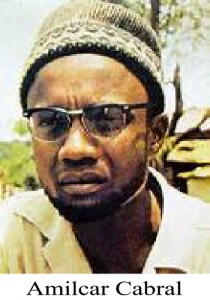 Although I was engaged with liberation struggles in Mozambique and Angola from the mid-1960s, I never had the opportunity to meet Amilcar Cabral. Nor have I ever visited the countries for whose freedom he lived and died. But like countless others in Africa and around the world, I have taken inspiration from the clear-minded guidance and analysis he provided while leading the African Party for the Independence of Guinea-Bissau and Cape Verde (PAIGC).
Although I was engaged with liberation struggles in Mozambique and Angola from the mid-1960s, I never had the opportunity to meet Amilcar Cabral. Nor have I ever visited the countries for whose freedom he lived and died. But like countless others in Africa and around the world, I have taken inspiration from the clear-minded guidance and analysis he provided while leading the African Party for the Independence of Guinea-Bissau and Cape Verde (PAIGC).
For me the watchwords from Cabral that have meant the most are the call to “tell no lies, claim no easy victories.” There are many characteristics required for effective participation in struggles for social justice. But one is surely the determination to base one’s actions on an analysis of concrete realties, be honest with ourselves about difficulties we face, and, as Cabral noted in another context, “Always bear in mind that the people are not fighting for ideas, for the things in anyone’s head. They are fighting to win material benefits, to live better and in peace, to see their lives go forward … to preserve the future of their children.” [Guinea-Bissau: Toward Final Victory!: Selected Speeches and Documents from PAIGC (Richmond, Canada: Liberation Support Movement, 1974), 32. Although appearing in the collection in the same text as “tell no lies,” this is in fact from another document, the Portuguese original of which I have been unable to locate.]
While I have often cited these words, the request for this article prompted me to look a bit deeper into the context and to seek out the Portuguese-language original of the “General Watchwords” for the party from which they were taken. Both the Portuguese and my translation into English are included at the end of this article. It is clear “tell no lies” was not an isolated slogan, but part of a complex reflection on the need for criticism and self-criticism among members of the movement.
In trying to apply those guidelines today, in a context almost fifty years removed, we must, as Cabral insisted, take concrete realities into account. We are far from the era of disciplined and apparently unified liberation movements (with both their strengths and weaknesses). While the goal of national political freedom has been attained, the broader goals for which Cabral fought are far from achieved, not least in Guinea-Bissau, which was the terrain of his party’s armed struggle.
With globalized communications, his further admonitions, such as “Do not hide anything from the masses of the people” and “Practice and defend the truth, always the truth, to militants, leaders, and the people, whatever the difficulties the knowledge of the truth can create” are just as hard to implement as in his time, and perhaps even more so. While PAIGC militants may have been able to address “the people” in gatherings in the bush, the constituencies for today’s social justice movements are almost always dispersed and diverse enough that they can hardly be gathered in one place. Messages through multiple technologies to “militants” and “the people” are inevitably seen, heard, and interpreted or misinterpreted by multiple other audiences as well.
That said, I am convinced that the fundamental principles of Cabral’s guidance on criticism and self-criticism still apply. And these watchwords fit within the broader context of his determination to base strategy and action on sober analysis of realities. [See also “Start out from the reality of our land – to be realists,” in Amilcar Cabral, Unity and Struggle (New York: Monthly Review Press, 1979) 44-63).] It is an eminently “scientific” approach, where theory is used not as a lazy substitute for empirical investigation but as a guide to it. It is an approach which recognized that the same formula could not be applied to situations as different as GuineaBissau and Cape Verde, or even to different regions within Guinea-Bissau.
It is also one in which fighting against an “enemy” never obscured the recognition that enemy forces were composed of human beings, many of whom might become friends under other circumstances. In this, Cabral shared the conviction of leaders such as Eduardo Mondlane and Samora Machel of Mozambique, that distinguishing friends and enemies on the basis of race, nationality, institutional affiliation, or other generic characteristics was a fundamental mistake. And that assuming individuals and political structures could not change was a recipe for failure in the struggle. “Know well our own strength and the enemy strength” was also a mandate to know how to win new allies, including among the enemy forces themselves.
This short essay can hardly be adequate for an extensive discussion of the application of Cabral’s principles to specific situations facing us today. But it would be incomplete without at least some mention of areas in which, in my opinion, progressive forces have been particularly weak in recent years, evading Cabral’s imperatives to investigate concrete realities and to speak the truth.
Let me very briefly address two areas, as examples. One concerns the international debates about political conflicts in Africa, including recent or forthcoming military interventions. The second is the sensitive issue of whether progressive as well as mainstream nongovernmental organizations are willing to live up to Cabral’s directives about truth-telling; or, in other words, to practice for themselves the accountability and transparency they freely demand of African and Western governments.
Every internal conflict on the continent features different narratives from parties to the conflict, which are taken up and propagated by international allies. It would be presumptuous for anyone to assume that there is one easy “truth” in the conflicts in Zimbabwe, Libya, or Mali – to cite only a few prominent examples. The only country of the three I know enough about and have enough personal trusted contacts in to write about at any length is Zimbabwe (see, for example, my 2010 article with Briggs Bomba: http://www.africafocus.org/docs10/zim1004.php). But in reposting material from other sources in AfricaFocus Bulletin, and providing brief introductory editor’s notes, I have to distinguish between analyses I regard as worth reading and those which are so dubious they should rank as “lies”, or at least, using a term also cited by Cabral, as based on superficial “appearances.” [You can see what I decided I thought worth reading, among sources available to me, at http://www.africafocus.org/country/countries.php, and clicking on the relevant country name for the AfricaFocus Bulletins on the country.]
Perhaps I am remiss in not naming names falling among the latter. But they include those who, decades after ZANU-PF ceased to be a liberation movement to become the enforcer of a new repressive and oligarchical system, insist on supporting the incumbent regime in Zimbabwe simply because its critics include Western governments. It includes those who see developments in Libya as primarily the outcome of a Western plot and disregard the agency of Libyans themselves in his overthrow of Qaddafi, or dismiss his opponents as Western dupes. And it includes those who think there is any easy answer to the current question of whether to intervene and who should intervene against the Islamic extremists who have devastated Northern Mali.
Rejecting such interpretations as “lies”, or based on “appearances”, does not imply that there are not also real questions about the motives and strategies of other opposing forces, both internal and international. It is not a blanket endorsement of those who now oppose ZANU-PF or the Islamists in Northern Mali, or those who contributed to the overthrow of the Qaddafi regime. It is simply to say that in none of these situations, or in other conflicts on the continent, is simply opposing what the United States does or what the West does a substitute for analysis of the concrete realities of each country, its surrounding region, and changing international power balances. Progressives may and will reach different conclusions about the best course of action after making such analyses. But the ideological shortcut of making judgments based on “ideas in people’s heads” rather than analysis of complex realities, is clearly one that Amilcar Cabral would have rejected.
Finally, a few incomplete and admittedly inadequate words about non-governmental organizations and the pressures that work against transparency and accountability to broader constituencies. A high proportion of such groups, both mainstream and progressive, are governed by selfperpetuating boards of directors. For funding they depend either on a small number of large institutional donors (foundations or indirect government support) or fundraising appeals to a large number of individual donors, most of whom have no role apart from sending in their donations. In most cases, membership dues from a engaged and active membership are only a small proportion of income at best, and the role of such stakeholders in governance is most often token at best and commonly none at all. The boards of directors therefore may have little sense of accountability to their activist supporters or feel any real obligation to keep them informed.
It would be a mistake to interpret accountability and transparency as a dogmatic mandate to never have private internal discussions or to “tell everything”, regardless of the consequences. Despite his call below to tell the truth, regardless of the difficulties it may cause, Cabral was well aware of the need for discretion in public discussion of sensitive issues, such as the difficulties his party faced from host countries such as Senegal and Guinea (Conakry), or the support the struggle received from Cuba. Nevertheless, I think many nongovernmental organizations, including progressive ones, most often err on the side of secrecy in speaking with their supporters about difficulties faced.
For much of the history of the organizations with which I have been most involved over my time as an activist, most notably the predecessor organizations of Africa Action (Africa Fund, American Committee on Africa, Washington Office on Africa, and the Africa Policy Information Center), this structural flaw was balanced by the fact that foundation income was minimal and government income non-existent. The bulk of individual donations, both large and small, came from engaged activists who expected and received accountability from those governing the organizations, including regular reports on program and financial status.
Yet all progressive activists are well aware of crises in multiple organizations run by progressive people whose good intentions we respect, in which the constituencies who have helped build the organization are kept in the dark about current developments reflecting weaknesses. It would not be appropriate to go into details, so as not to violate Cabral’s companion insistence in the text below that criticism should not edge over into “intrigues.” But it is surely no secret to anyone concerned, for example, that those who contributed their writing skills to Pambazuka News over more than a decade have had no report from the governing board of Fahamu on the crisis which led to the resignation of the founding editor.
Most painful to many of us involved in Africa solidarity work in the United States has been the prolonged crisis at Africa Action. In August 2010 staff unexpectedly failed to receive their salaries. It was subsequently discovered that a reserved endowment had been fully drained, in part by fraud by an office manager and in part by use of endowment funds for operating expenses. Since then, the organization’s board has managed to keep a shell of the organization in existence. Yet more than two years later there has still been no coherent accounting to the organization’s constituency of what happened nor a strategy for the future which could address the crisis of confidence among former staff, board, and supporters of the organization. Despite the good intentions of the board members, it is likely that the failure to follow Cabral’s advice by confronting hard realities and “telling the truth” will have done as much or more damage to the organization as did the original financial crisis.
I am well aware that these brief remarks fall far short of any “full truth” or even a comprehensive analysis of any of the issues raised. But hopefully they may serve at least as a call to follow Cabral’s example in analyzing concrete realities more deeply rather than relying on appearances, and in using criticism constructively to learn from our own and other’s mistakes.
William Minter, Editor, AfricaFocus
Excerpts from Chapter VIII, “Apply Party Principles in Practice,” in General Watchwords, November 1965.
Portuguese original is in “Palavras de Ordem Gerais,” in P.A.I.G.C.: unidade e luta / Amilcar Cabral (Lisbon: Nova Aurora, 1974), 9-66.
English translation below by William Minter
[Alternate English translation of full text of “General Watchwords” is available in Amilcar Cabral, Unity and Struggle (New York: Monthly Review Press, 1979), pages 246-249.]
1. Develop the spirit of criticism among activists and officials.
Give everyone at each level, the opportunity to criticize, give their opinion about the work and the behavior or actions of others. Accept criticism, wherever it comes from, as a contribution to improving the work of the Party, as an expression of active interest in the internal life of our organization. Remember always that to criticize is not to speak ill or engage in intrigues. Criticism is and must be the act of expressing one’s frank opinion openly, in front of those concerned, based on the facts and in the spirit of justice, in order to evaluate the thought and action of others, with the aim of improving that thought and action. Criticism is to build, to help build, to show genuine interest in the work of others and the improvement of that work.
Combat severely evil tongues, intrigues, ‘so-and-so says,’ unfair and unfounded criticism. To evaluate the thought and action of a comrade does not necessarily mean to speak ill of them. To speak highly, praise, encourage, or stimulate is also part of a critique. Always be vigilant against personal vanity and pride, but don’t stint on praise for those who deserve it. Offer praise gladly and frankly to all those whose thought and action serves well the progress of the party. …
Learn from the mistakes we make or that others make, to avoid making new mistakes, to not fall into the traps that others have fallen in. Criticizing someone does not mean setting yourself against them or victimizing them. It is showing that we are all interested in their work, that we are part of one corporate body, that one person’s mistakes affect us all, and that we are vigilant, as friends and comrades, to help them overcome their shortcomings and increasingly contribute to the improvement of the Party.
But critique (proof of the willingness of others to help us or our willingness to help others) should be supplemented by self-criticism (proof of our own willingness to help ourselves improve our thinking and our action).
Develop in all militants, leaders, and combatants, the spirit of self-criticism: the ability of each to make a concrete analysis of their own work, to distinguish good from bad, to recognize their own mistakes and to discover the causes and consequences of these errors. Making a self-criticism is not just to say “yes, I admit my fault, my mistake, and I apologize,” while getting ready to commit new faults and new errors. It is not to pretend to repent, while still being convinced that the other person just doesn’t understand. Nor should self-criticism be performed as a ritual, while continuing to make mistakes.
Self-criticism is not doing penance. It is an act of honesty, courage, camaraderie, and awareness of our responsibilities, a proof of our willingness to do our duty and do it well, a manifestation of our determination to be better every day and give our best contribution to the advancement of our Party. An honest self-criticism does not require absolution: it is a commitment we make to our conscience not to commit more errors, to accept our responsibilities to others, and to mobilize all our capabilities to do more and better. Self-criticism is to rebuild oneself to better serve.
…
4. Practice revolutionary democracy in all aspects of the life of the party.
Everyone responsible for leadership must assume their responsibilities with courage, should demand the respect of others for their activity, and should respect the work of others. Do not hide anything from the masses of the people. Don’t tell lies. Fight lies when they are told. Don’t disguise difficulties, errors, and failures. Do not trust in easy victories nor in appearances.
Revolutionary democracy demands that we fight opportunism and not tolerate errors, baseless excuses, friendships and camaraderie based on interests contrary to the interests of the Party and the people, or the conviction that any leader is irreplaceable.
Practice and defend the truth, always the truth, to militants, leaders, and the people, whatever the difficulties the knowledge of the truth can create.
Portuguese original:
1. Desenvolver o espirito da crítica entre os militantes e responsáveis.
Dar a todos, em cada nivel, a oportunidade de críticar, de dar a sua opinião sobre o trabalho e o comportamento ou a acção dos outros. Aceitar a crítica, donde quer qua ela venha, como uma contribuição para melhorar o trabalho do Partido, como uma manifestação de interesse active pela vida interna da nossa organização. Lembrar-se sempre que críticar não é dizer mal nem fazer intrigas. Críticar é e deve ser o acto de exprimir uma. opinião franca, aberta, diante dos interessados, com base nos factos e com espírito de justiça, para apreciar o pensamento e a acção dos outros, com o objectivo de melhorar esse pensamento e essa acção. Críticar é construir, ajudar a construir, fazer prova de interesse sincero pelo trabalho dos outros, pela melhoria desse trabalho.
Combater severamente a má lingua, a mania das intrigas, o ‘diz-que-diz,’ as críticas injustas e sem fundamento. Apreciar o pensamento e a acção dum camarada não é necessariamente dizer mal. Dizer bem, elogiar, encorajar, estimuar—também é críticar. Sempre vigilantes contra as vaidades e orgulhos pessoais, devemos no entanto poupar elogios a quem os merece. Elogiar com alegria, com franqueza. diante dos outros, todo aquele cujo pensamento e acção servem bem o progresso do Partido. Devemos igualmente aplicar uma crítica justa, denunciar francamente, censurar, condenar e exigir a condenação de todos aqueles que praticam actos contrários ao progresso e aos interesses do Partido; combater cara a cara os erros e faltas, ajudar os outros a melhorar o seu trabalho. Tirar lição de cada erro que cometemos ou que os outros cometem, para evitar cometer novos erros, para cairmos nas asneiras em que os outros cairam. críticar um camarada não quer dizer pôr-se contra o camarada, fazer um sacrificio em que o camarada é a vïtima: é mostrar-lhe que estamos todos interessados no seu trabalho, que somos um e um só corpo, que os erros dele prejudicam a nós todos, e que estamos vigilantes, como amigos e camaradas, para ajudé-lo a vencer as suas deficiências e a contribuir cada vez mais para que o Partido seja cada vez melhor. …
Mas a crítica (prova da vontade dos outros de nos ajudar ou da nossa vontade de ajudar os outros) deve ser completada pela autocrítica (prova da. nossa própria vontade de nos ajudarmos a nós mesmos a melhorar o nosso pensamento e a nossa acção).
Desenvolver em todos os militantes, responséveis e combatentes, o espirito da autocrítica: a. capacidade de cada um fazer uma análise concreta do seu pr6prio trabalho, de distinguir nele o que está bem do que está mal, de reconhecer os seus próprios erros e de descobrir as causas e as consequências desses erros. Fazer uma autocrítica. néo é apenas dizer sim, reconheço a minha falta, o meu erro—e peço perdão, ficando logo pronto para cometer novas faltas, novos erros. Não é fingir-se arrependido do mal que fez, e ficar, no fundo, convencido de que os outros é que n~ao o compreendem. Nem tão-pouco fazer autocrítica e fazer uma cerimónia para depois poder ficar com a. consciéncia tranquila e continuar a cometer erros.
Autocríticar-se não é pagar um responso ou uma bula nem é fazer penitência. A autocrítica é um acto de franqueza, de coragem, de camaradagem e de consciência das nossas responsabilidades, uma. prova. da nossa vontade de cumprir e de cumprir bem, uma manifestação da nossa. determinação de ser cada dia melhor e dar uma. melhor contribuição para o progresso do nosso Partido. Uma autocrítica sincera não exige necessariamente uma absolvição: é um compromisso que fazemos com a nossa consciência. para não cometermos mais erros; é fazer aceitar as nossas responsabilidades diante dos outros e mobilizar todas as nossas capacidades para. fazer mais e melhor. Autocríticar-se é reconstruir-se a si mesmo, para melhor servir.
…
4. Praticar, em todos os aspectos da vida do Partido, a democracia revolucionária.
Cada responsável deve assumir com coragem as suas responsabilidades, deve exigir dos outros o respeito pela sua actividade e deve respeitar a actividade dos outros. Não esconder nada às massas populares, não mentir, combater a mentira, não disfarçar as dificuldades, os erros e insucessos, não acreditar em vitárias fáceis, nem nas aparêcias.
A democracia revolucionária exige que devemos combater o oportunismo, a. tolerância diante dos erros, as desculpas sem fundamento, as amizades e a camaradagem com base em interesses contrários aos do Partido e do povo, a mania de que um ou outro responszivel é insubstituivel no seu posto.
Praticar e defender a verdade, sempre a verdade, diante dos militantes, dos responséveis, do povo, sejam quais forem as dificuldades que o conhecimento da verdade possa criar.
—————————————————————————————————————————————–
AfricaFocus Bulletin is an independent electronic publication providing reposted commentary and analysis on African issues, with a particular focus on U.S. and international policies. AfricaFocus Bulletin is edited by William Minter.
AfricaFocus Bulletin can be reached at Africafocus@igc.org. Please write to this address to subscribe or unsubscribe to the bulletin, or to suggest material for inclusion. For more information about reposted material, please contact directly the original source mentioned. For a full archive and other resources, see http://www.africafocus.org
Like this:
Like Loading...
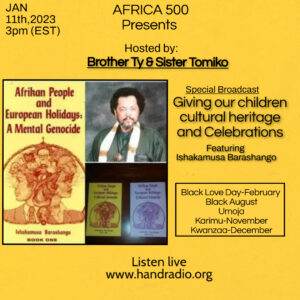 The January 11, 2023 edition of Africa 500 will feature the words of the Rev. Dr. Ishakamusa Barsashango.
The January 11, 2023 edition of Africa 500 will feature the words of the Rev. Dr. Ishakamusa Barsashango.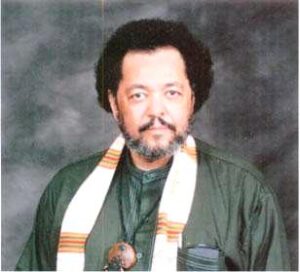 Rev. Dr. Ishakamusa Barashango, affectionately known as “Baba”, began his journey to Nsamando, the land of the Ancestors on January 14, 2004. He apparently succumbed to a heart attack during his morning walk. The dynamic minister, author, historian, educator and motivational speaker was born April 27, 1938 in Philadelphia, PA.
Rev. Dr. Ishakamusa Barashango, affectionately known as “Baba”, began his journey to Nsamando, the land of the Ancestors on January 14, 2004. He apparently succumbed to a heart attack during his morning walk. The dynamic minister, author, historian, educator and motivational speaker was born April 27, 1938 in Philadelphia, PA.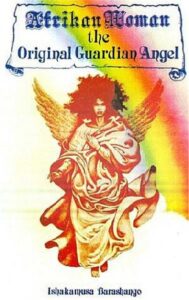 As well as releasing a series of audio lecture compact disks, Dr Barashango was the author of several books including: Afrikan People And European Holidays: A Mental Genocide Book One; Afrikan People And European Holidays: A Mental Genocide Book Two; God, the Bible and the Black Man’s Destiny; Afrikan Woman: The Original Guardian Angel; and Afrikan Genesis: Amazing Stories of Man’s Beginnings. Dr Barashango was completely dedicated to the physical, mental, and spiritual liberation of New Afrikan people – he dedicated his life to this cause!
As well as releasing a series of audio lecture compact disks, Dr Barashango was the author of several books including: Afrikan People And European Holidays: A Mental Genocide Book One; Afrikan People And European Holidays: A Mental Genocide Book Two; God, the Bible and the Black Man’s Destiny; Afrikan Woman: The Original Guardian Angel; and Afrikan Genesis: Amazing Stories of Man’s Beginnings. Dr Barashango was completely dedicated to the physical, mental, and spiritual liberation of New Afrikan people – he dedicated his life to this cause!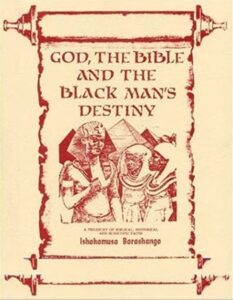 the covenant he swore with an oath to our ancestor Abraham.
the covenant he swore with an oath to our ancestor Abraham.
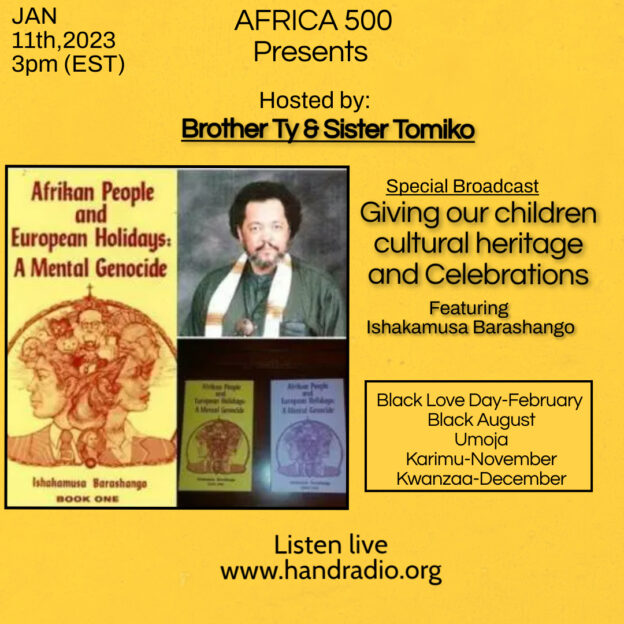
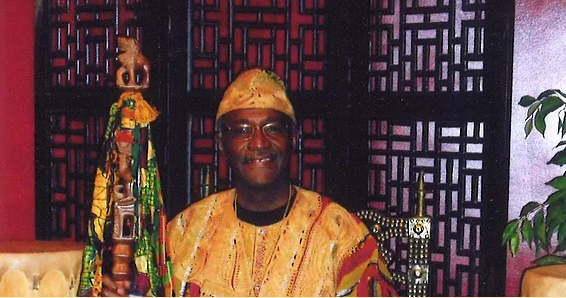
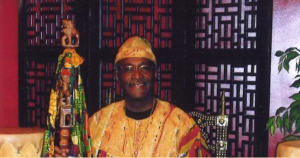 In August of 2013, the Sixth Region Diaspora Caucus (SRDC) held its annual International Summit in Los Angeles, California. Every Summit includes at least one event or gathering that underscores the cultural and spiritual essence of Pan-Afrikan organizing, a reminder of exactly what we all are struggling against our oppressors to protect and build. In 2013, that event was held at the KRST Unity Center of Afrakan Spiritual Science. The event included video presentations, musical performances, guest speakers and exchanges with the audience. Personally, it was my first and, so far, only visit to KRST, but the impact I felt from that one visit was deep and lasting. That spirit can largely be traced to the leadership of Rev. Richard Meri Ka Ra Byrd, the Senior Minister of KRST. He has now been called by the Ancestors to the realm of the infinite, to minister to our community from the other side.
In August of 2013, the Sixth Region Diaspora Caucus (SRDC) held its annual International Summit in Los Angeles, California. Every Summit includes at least one event or gathering that underscores the cultural and spiritual essence of Pan-Afrikan organizing, a reminder of exactly what we all are struggling against our oppressors to protect and build. In 2013, that event was held at the KRST Unity Center of Afrakan Spiritual Science. The event included video presentations, musical performances, guest speakers and exchanges with the audience. Personally, it was my first and, so far, only visit to KRST, but the impact I felt from that one visit was deep and lasting. That spirit can largely be traced to the leadership of Rev. Richard Meri Ka Ra Byrd, the Senior Minister of KRST. He has now been called by the Ancestors to the realm of the infinite, to minister to our community from the other side.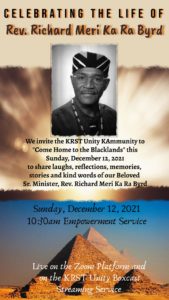 With heavy hearts the Board of Directors of KRST Unity Center of Afrakan Spiritual Science and the Ministerial Staff announce the transition of our beloved Senior Minister, Reverend Richard Meri Ka Ra Byrd into the Ancestral Realm on Sunday, December 5, 2021.
With heavy hearts the Board of Directors of KRST Unity Center of Afrakan Spiritual Science and the Ministerial Staff announce the transition of our beloved Senior Minister, Reverend Richard Meri Ka Ra Byrd into the Ancestral Realm on Sunday, December 5, 2021.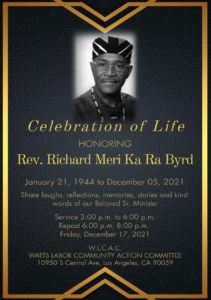 A Celebration of Life for Rev. Richard Meri Ka RA Byrd
A Celebration of Life for Rev. Richard Meri Ka RA Byrd
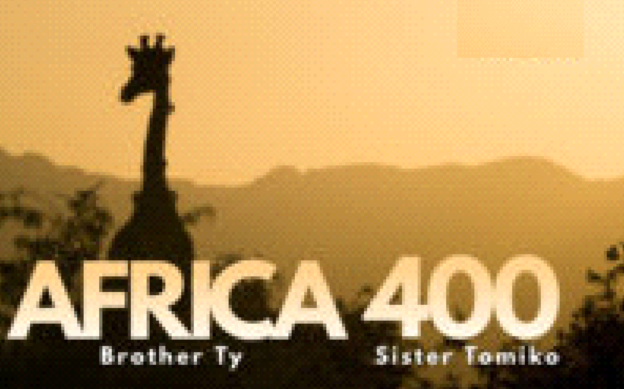
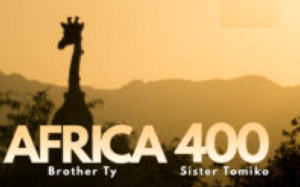 Africa400, the weekly Pan-Afrikan radio show hosted by Mama Tomiko and Baba Ty, with Special Episodes guest-hosted by Grandmother Walks On Water (“Mothership”) and Baba Francois Ndengwe (“Fresh News From Africa”), is taking a break from broadcasting as they make plans for the coming year.
Africa400, the weekly Pan-Afrikan radio show hosted by Mama Tomiko and Baba Ty, with Special Episodes guest-hosted by Grandmother Walks On Water (“Mothership”) and Baba Francois Ndengwe (“Fresh News From Africa”), is taking a break from broadcasting as they make plans for the coming year.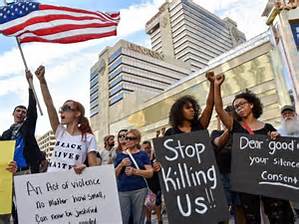 For many, the issue of police brutality and the social upheaval it brings was brought home with the killing of Michael Brown two years ago in Ferguson, Missouri, and the cell phone video-inspired emergence of a nationwide protest movement centered on police violence and abuse against Black people and other people of color. Just before that, of course, was the killing of Trayvon Martin by police-wannabe George Zimmerman and the rise of Black Lives Matter as protests started spreading across the nation. Some of us remember Abner Louima (1997), Amadou Diallo (1999) and Sean Bell (2006) in New York City, and Oscar Grant in Oakland and Adolph Grimes in New Orleans, both on New Year’s Day 2009. For others, it was the 1991 beating of motorist Rodney King, the first time many of us ever saw videographic evidence of police brutality, and the 1992 Los Angeles “Rebellion” (or “riots”, depending on your perspective) that followed. Those with more of a sense of history will recall the August 28, 1955 lynching of Emmett Till by an angry mob of White vigilantes, or the bombing of Black Wall Street in Tulsa, Oklahoma in 1921, both under the direction of White hate groups like the Ku Klux Klan but clearly with the acquiescence of local law enforcement. And those who want to go “all the way back” will point out the fact that the earliest municipal police departments were often commissioned to pursue runaway slaves in enforcement of the Fugitive Slave Acts of 1793 and 1850, a pursuit reminiscent of the slave catchers that kidnapped our Ancestors from Afrika in the first place. Despite the recent killings of Martin, Brown, Eric Garner, Sandra Bland, Walter Scott, Tyrone West, Freddie Gray and so many other, lesser-known victims of police brutality over the last two years, the annual fireworks spectacle on July 4th seemed to provide a chance for many of us to marvel at the rockets’ red glare, revel in the belief in (or the illusion of) “one nation indivisible” and go back to sleep for a while.
For many, the issue of police brutality and the social upheaval it brings was brought home with the killing of Michael Brown two years ago in Ferguson, Missouri, and the cell phone video-inspired emergence of a nationwide protest movement centered on police violence and abuse against Black people and other people of color. Just before that, of course, was the killing of Trayvon Martin by police-wannabe George Zimmerman and the rise of Black Lives Matter as protests started spreading across the nation. Some of us remember Abner Louima (1997), Amadou Diallo (1999) and Sean Bell (2006) in New York City, and Oscar Grant in Oakland and Adolph Grimes in New Orleans, both on New Year’s Day 2009. For others, it was the 1991 beating of motorist Rodney King, the first time many of us ever saw videographic evidence of police brutality, and the 1992 Los Angeles “Rebellion” (or “riots”, depending on your perspective) that followed. Those with more of a sense of history will recall the August 28, 1955 lynching of Emmett Till by an angry mob of White vigilantes, or the bombing of Black Wall Street in Tulsa, Oklahoma in 1921, both under the direction of White hate groups like the Ku Klux Klan but clearly with the acquiescence of local law enforcement. And those who want to go “all the way back” will point out the fact that the earliest municipal police departments were often commissioned to pursue runaway slaves in enforcement of the Fugitive Slave Acts of 1793 and 1850, a pursuit reminiscent of the slave catchers that kidnapped our Ancestors from Afrika in the first place. Despite the recent killings of Martin, Brown, Eric Garner, Sandra Bland, Walter Scott, Tyrone West, Freddie Gray and so many other, lesser-known victims of police brutality over the last two years, the annual fireworks spectacle on July 4th seemed to provide a chance for many of us to marvel at the rockets’ red glare, revel in the belief in (or the illusion of) “one nation indivisible” and go back to sleep for a while.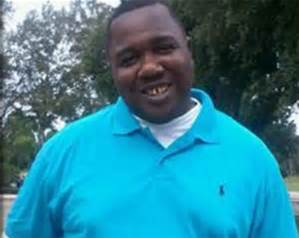 celebration of the independence of the United States, Alton Sterling (June 14, 1979 – July 5, 2016), known locally as “CD Man”, was shot and killed by police officers in Baton Rouge, Louisiana as he was selling compact disks outside a convenience store. This account of the events of that day comes from Wikipedia(
celebration of the independence of the United States, Alton Sterling (June 14, 1979 – July 5, 2016), known locally as “CD Man”, was shot and killed by police officers in Baton Rouge, Louisiana as he was selling compact disks outside a convenience store. This account of the events of that day comes from Wikipedia(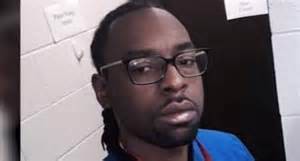 Then, as though following the unfortunate tradition that one bad turn must lead to another, Philando Castile was killed by a Minnesota police officer during what was supposed to be a routine traffic stop (
Then, as though following the unfortunate tradition that one bad turn must lead to another, Philando Castile was killed by a Minnesota police officer during what was supposed to be a routine traffic stop (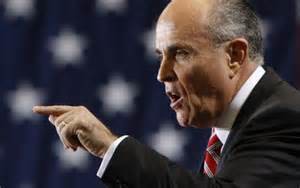
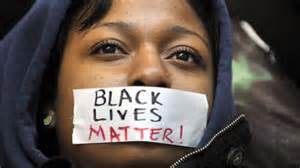 on the backs of police officers across the country and calling for the execution of police, despite no evidence whatsoever that any BLM activist has ever advocated for such a thing. But the racist vitriol didn’t stop there. Texas Republican Representative Louie Gohmert declared that President Obama has repeatedly failed to unite Americans after tragedies like the shooting in Dallas (
on the backs of police officers across the country and calling for the execution of police, despite no evidence whatsoever that any BLM activist has ever advocated for such a thing. But the racist vitriol didn’t stop there. Texas Republican Representative Louie Gohmert declared that President Obama has repeatedly failed to unite Americans after tragedies like the shooting in Dallas (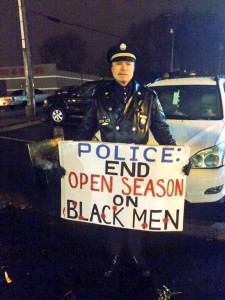 In spite of the multitude of bombastic comments that appear designed to increase tensions between the police and the citizenry (particularly the Black citizenry), there are White voices, and White police voices, that have swum against the current and have been raised against police brutality. A consistent voice in opposition of late has been that of retired Philadelphia Police Captain Ray Lewis (no, not the future Hall of Fame football player), who was once a self-admitted “brutal cop” who came to realize the abusive nature of his job and since that time has frequently been arrested, in full police uniform, while protesting against police brutality. His Facebook page (
In spite of the multitude of bombastic comments that appear designed to increase tensions between the police and the citizenry (particularly the Black citizenry), there are White voices, and White police voices, that have swum against the current and have been raised against police brutality. A consistent voice in opposition of late has been that of retired Philadelphia Police Captain Ray Lewis (no, not the future Hall of Fame football player), who was once a self-admitted “brutal cop” who came to realize the abusive nature of his job and since that time has frequently been arrested, in full police uniform, while protesting against police brutality. His Facebook page (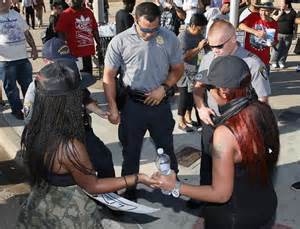 apparently did, and they turn their skills at combat inward on themselves or outward against their own communities or against the police. And the result is often as we see here: a backlash against Black activism of any kind, an escalation of the militarization of police forces and a crackdown against the civil liberties of all those who would speak out in protest against the encroaching police state. Instead, what our young battle-tested but combat-weary men and women must do is come “home” to their people, learn to use their skills for the defense of their community instead of the assault on an enemy they often misidentify and cannot defeat, help to teach our young people how to use their skills constructively for their people, defend our community leaders from the gang-bangers as well as the storm-troopers, and heal themselves and our communities at the same time. In the face of heightened antagonism from the political right-wing, paranoia from the police and feelings of anger, confusion, misdirection, aggression and hopelessness from our own community, what we need now are safe spaces where we can share together, heal together, grow together and, most importantly, build together. Now more than ever, especially with the prospect of a new president in the White House whom many Black people will either distrust or outright fear, it is important for us to, as Ancestor Kwame Ture (Stokely Carmichael) said decades ago, organize, organize, organize.
apparently did, and they turn their skills at combat inward on themselves or outward against their own communities or against the police. And the result is often as we see here: a backlash against Black activism of any kind, an escalation of the militarization of police forces and a crackdown against the civil liberties of all those who would speak out in protest against the encroaching police state. Instead, what our young battle-tested but combat-weary men and women must do is come “home” to their people, learn to use their skills for the defense of their community instead of the assault on an enemy they often misidentify and cannot defeat, help to teach our young people how to use their skills constructively for their people, defend our community leaders from the gang-bangers as well as the storm-troopers, and heal themselves and our communities at the same time. In the face of heightened antagonism from the political right-wing, paranoia from the police and feelings of anger, confusion, misdirection, aggression and hopelessness from our own community, what we need now are safe spaces where we can share together, heal together, grow together and, most importantly, build together. Now more than ever, especially with the prospect of a new president in the White House whom many Black people will either distrust or outright fear, it is important for us to, as Ancestor Kwame Ture (Stokely Carmichael) said decades ago, organize, organize, organize.
